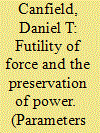| Srl | Item |
| 1 |
ID:
122397


|
|
|
|
|
| Publication |
2012.
|
| Summary/Abstract |
I
n the spring of 1763 Great Britain, basking in the warm afterglow of decisive
victory in the Seven Years War, presided over a vast and unprecedented
global empire. The small island nation seemingly, and rather suddenly, found
itself without peer-enjoying a level of military and political hegemony not
seen since the days of the Roman Empire.2
It was a unique, albeit fleeting,
position. In the span of a mere twenty years, the world's preeminent global
power, despite enjoying a considerable advantage in almost every conceivable category used to calculate military potential, found itself disgraced and
defeated by a start-up nation possessing a markedly inferior conventional military capability. Crippled by a grossly burgeoning national debt, diplomatically
isolated, and politically divided at home, the North Ministry became embroiled
in a protracted and unpopular global war that its policymakers and military
leaders seemed incapable of understanding-much less winning-until it was
far too late.3
|
|
|
|
|
|
|
|
|
|
|
|
|
|
|
|
| 2 |
ID:
141648


|
|
|
|
|
| Summary/Abstract |
As a contribution to the study of empire and imperial ambition, the present study considers the greatest analysis—Xenophon's The Education of Cyrus—of one of the greatest empires of antiquity—the Persian. Xenophon's lively and engaging account permits us to watch Cyrus as he builds a transnational empire, at once vast and stable. Yet Xenophon is ultimately highly critical of Cyrus, because he lacks the self-knowledge requisite to happiness, and of the empire, whose stability is purchased at the price of freedom. Cyrus finally appears as a kind of divinity who strives to supply the reward for moral excellence that the gods evidently do not. Xenophon implies that any truly global empire would have to present itself as a universal providential power capable of bestowing on human beings a blessed happiness that as such transcends our very mortality.
|
|
|
|
|
|
|
|
|
|
|
|
|
|
|
|